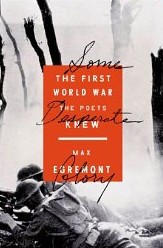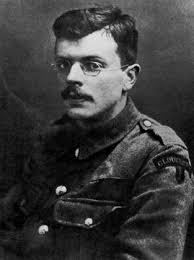Today is Armistice Day. Ninety-six years ago, Germany surrendered and brought World War I to an end. The wreckage left behind by the war was enormous. More than 16 million people died, seven million of them civilians. Monarchies had ended in Russia, Austria-Hungary, Germany and the Ottoman Empire. The maps of Europe and the Middle East were redrawn. New nations were formed. Lenin and the Communist Party had taken control in Russia, except the control was tenuous, only to be decided by an ugly civil war. Massive war reparations were imposed on Germany, which would ultimately contribute to ruinous hyperinflation. Victorious Britain and France faced huge war debts.
The emotional and psychological impact on victor and defeated was just as significant. That emotion and psychology had begun during the war, and it no better articulated than by the group of Britons collectively known as the War Poets.
We’ve spent the last several weeks discussing the poets and poetry of World War I. What we have not considered in detail in the context of the poets and what they wrote – and that context is the war itself, the Great War, the War to End All Wars.

Egremont uses a chronological structure, covering the five years (or parts of years) the war lasted. He places the poets within the events they were part of – the horrific battles, the hospitals in the fields and back home, the trenches, and the home leaves. And then he highlights each section with poems written during that year. The reader sees not only who these poets were and what they wrote but also the actual conditions they faced and engaged in.
And we see many of these young poets, home in London on leave, clustering around Harold Munro’s Poetry Bookshop in Bloomsbury near the British Museum, meeting each other, talking with each other and visiting Americans like Robert Frost, attending readings, and seeking to get their poems published. As the war progressed, their numbers thinned.
The 11 poets followed in the book are Siegfried Sassoon (whom we discussed here last week), Wilfred Owen, Edmund Blunden, Julian Grenfell, Rupert Brooke, Isaac Rosenberg, Charles Sorley, Edward Thomas, Robert Nichols, Ivor Gurney, and Robert Graves. Some died early in the war; some died of illness and not battle wounds. Others survive the war and go on to build literary careers. And as Egremont points out, the war poets cut across the British class system, coming from the upper, middle and working classes.
Most of the major battles of the war are represented as well, although the focus is the war on the Western Front in Belgium and France, because that’s where the poets were concentrated. And so the names move across the pages – Ypres, Verdun, Loos, the Marne, the Somme, Antwerp and more. (Only Brooke died in another theater of war, of a non-war-related illness, before he reached what would become the Battle of Gallipoli near Constantinople.)
An example of the poems included with each chronological section is this one by Ivor Gurney, written in 1915:

Now, youth, the hour of thy dread passion comes;
Thy lovely things must all be laid away;
And thou, as others, must face the riven day
Unstirred by rattle of the rolling drums,
Or bugles’ strident cry. When mere noise numbs
The sense of being, the sick soul doth sway,
Remember thy great craft’s honour, that they may say
Nothing in shame of poets. Then the crumbs
Of praise the little versemen joyed to take
Shall be forgotten; then they must know we are,
For all our skill in words, equal in might
And strong of mettle as those we honoured; make
The name of poet terrible in just war,
And like a crown of honour upon the fight.
Gurney would survive the war, but longstanding mental illness that predated the war would dog him the rest of his life. He was institutionalized in 1922, and live in asylums until he died of tuberculosis in 1937.
Some Desperate Glory is a fine volume, pulled from poems and letters and infused with history and biography. It explains where so much of this famous poetry came from, and it teaches us some of what these war poets experienced and endured.
On this Armistice Day, stop and remember the sacrifices of World War I; stop and remember the beautiful poetry that emerged from the horror.
Photo by Susan Etole. Post by Glynn Young, author of the novels Dancing Priest and A Light Shining, and Poetry at Work.
Want to brighten your morning coffee?
Subscribe to Every Day Poems and find some beauty in your inbox.
- Poets and Poems: Avraham Stern and “A Soldier and a Poet” - July 15, 2025
- Poets and Poems: Beth Copeland and “I Ask the Mountain to Heal My Heart” - July 10, 2025
- A.E. Stallings: the Parthenon Marbles, Poets, and Artists - July 8, 2025

[…] enlisted in the British Army, and died in 1917 in France. Today he’s known as one of the World War I poets. Frost went on to become, more than anyone else, the “American Poet.” And his poem, “Two […]